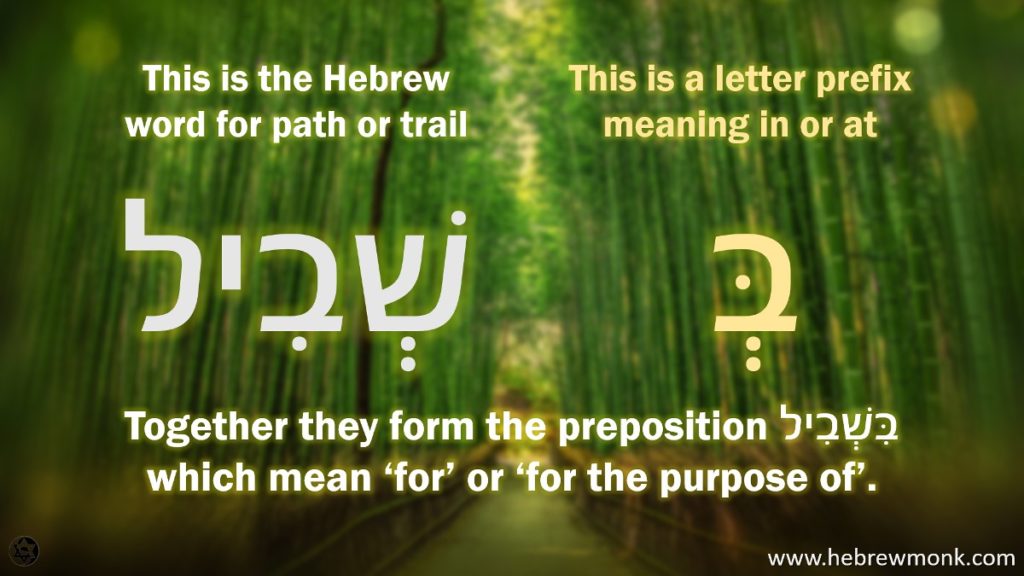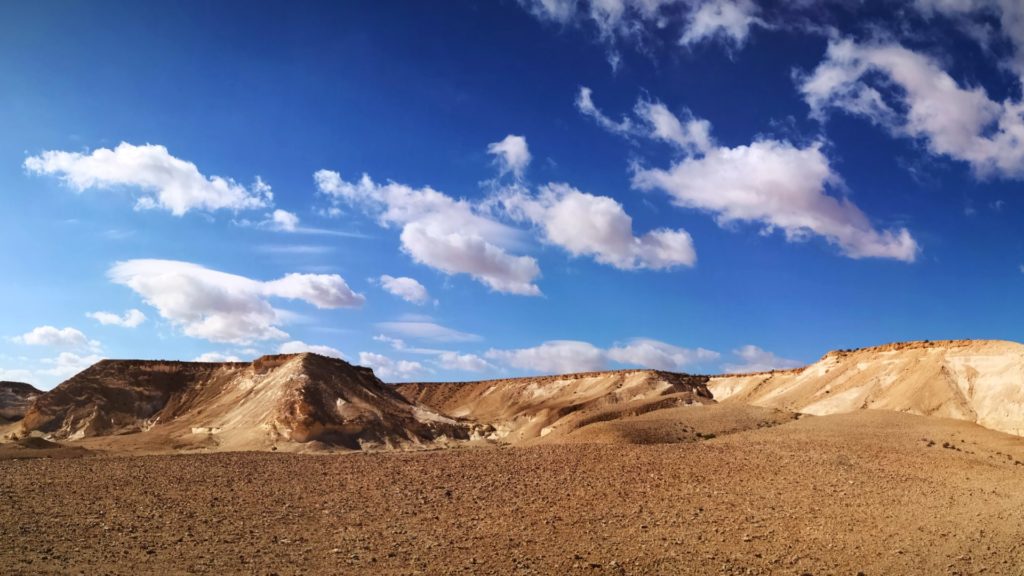Hebrew has a lot of beautiful words. Some are beautiful because of the way they sound; some are beautiful because of the way they are written; and some are beautiful because of what they describe or the association they create in the listener’s mind.
After giving it much thought and a lot of careful consideration, I think know what my favorite Hebrew word is. Not only does it sound nice (at least to my ears), but it also expresses a lovely meaning while painting a beautiful picture in people’s mind.
The word I am referring to is בִּשְׁבִיל which is pronounced bishvil. It is one of the ways to say ‘for’ in Hebrew, but unlike the prefix-preposition ‘לְ’, the preposition ‘בִּשְׁבִיל’ is mostly used in context of good intentions, or at the very least it expresses an intended purpose of an action.
But the true beauty of the word בִּשְׁבִיל is revealed when you dissect it in a more literal approach. Then you will find this preposition itself is a combination of a noun and another preposition.

The main part of the preposition בִּשְׁבִיל is the noun שְׁבִיל (shvil) which means a path or a trail. It is preceded by the prefix-preposition בְּ which means ‘in’ or ‘at’, and whole preposition can be literally understood as ‘in the path’.
This means that common question זֵה בִּשְׁבִילִי (ze bishvili) which is the way to ask “is that for me” in Hebrew, also means “is that in my path”. If you think that’s cool, take a look at the following question:
כַּמָּה רָחוֹק תֵּלְכוּ בִּשְׁבִיל הָאַהֲבָה
| how much / how many | kama | כַּמָּה |
| far | rachoq | רָחוֹק |
| you will go / walk (pl.) | telkhu | תֵּלְכוּ |
| for | bishvil | בִּשְׁבִיל |
| love | ahava | אַהֲבָה |
It means both “how far will you go for love” and “how far will you walk in the path of love”. The first time I noticed this double meaning I almost fell out of my seat.
Space Cows
This double meaning of the word בשביל is at the heart of the following classic crosswords clue which also makes a great dad joke.
למה שולחים פרה לחלל
(why send a cow into space)
The answer is בִּשְׁבִיל הֶחָלָב (bishvil hechalav). It means both “for the milk” and “in the Milky Way”. The Hebrew name of the Milky Way Galaxy is שביל החלב which literally mean ‘the milk trail’. By the way, in Chinese it is called 银河 (pinyin – yín hé) – Silver River, so I think they’ve won.

Speaking of milk in space, did you know that in 1997 Israeli milk and dairy manufacturer Tnuva actually did send milk to space in one of the most expensive commercials ever produced in Israel, and the first one in the world which was filmed in outer space?
And speaking of trails in space, another Hebrew word worth mentioning here is the word שׁוֹבֶל (shovel) which also means trail, but in the sense of a mark or a series of signs or objects left behind by the passage of someone or something. Think comets, shooting starts or the snail trail left on the table by a cold glass of milk on a hot summer day.
Just like the word שביל (shvil), the word שובל (shovel) is based on the shoresh shin-bet-lamed. It is believed that its original meaning was the markings left on the ground by person wearing a long dress or robe. Note that the right way to pronounce is shovel with the stress on the first syllable, though most Israeli wrongly say shoval with the stress on the last part, which they also pronounce with the mouth more open.
Combing back to the source
Both the word שביל (shvil) and the shoresh ש-ב-ל (shin-bet-lamed) are found in Biblical Hebrew. They also have counterparts in both Aramaic (ܫܒܝܠܐ) and Arabic (سَبِيل).
As far as I can tell, no one really know their exact origin, but I would like to suggest it is somehow related to the shoresh ש-פ-ל (shin-peh-lamed). The basic meaning of the shoresh ש-פ-ל is to become lower, to gradually drop or to slope down. You can find it in the word שֵׁפֶל (shefel) meaning low tide or rock bottom, the word שְׁפֵלָה (shfela) meaning lowlands, and the verb הִשְׁתַּפֵּל (hishtapel) meaning to slope down, to drop or to dangle down.
Trails in the sense of שביל (shvil) usually form between hills as the lowest and most convenient path possible, and trails in the original sense of שובל (shovel) were formed by long item of clothing which dropped and dangled (השתפלו) all the way down to the ground.
While we are on the subject of sloping, dropping, and dangling, it is also worth noting that in Modern Hebrew the word שביל (shvil) also refers to the line formed by the parting of one’s hair.

Clearly it has more to do with the line than with the hair. However, since the shoresh ש-ב-ל (shin-bet-lamed) is also the root of the word שִׁבּוֹלֶת (shibolet), which is mostly used to describe stalks of grain, who knows. Maybe it is related…
Actually, you know what? Maybe there’s also a link the Hebrew root ש-ב-ל and ש-פ-ל and the word ‘asphalt’. Okay, okay, I know that’s a real stretch. But the relation between ש-ב-ל and ש-פ-ל does have a strong case in my opinion.
Know thy trail
The cherry on top for me is the fact that the word שביל corresponds with the Chinese Character 道 (pinyin – dào). This character means path, but more importantly it represents the concept of Daoism. It also part of the verb 知道 (pinyin – zhī dào) which means to know, and therefor it always reminds me of this scene from The Matrix:
I really couldn’t ask for anything more in a word.
Cover photo by Maksim Shutov on Unsplash
Stay in Touch!
Get the next post from Hebrew Monk directly to you inbox!
Don't like emails? Subscribe to Heberw Monk's Telegram Channel instead.



